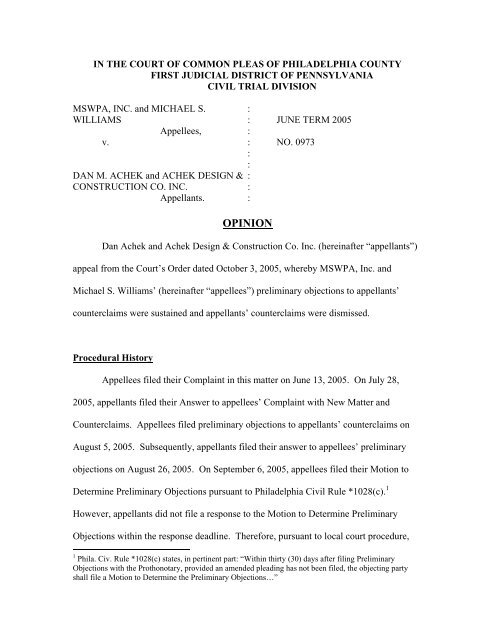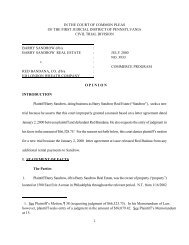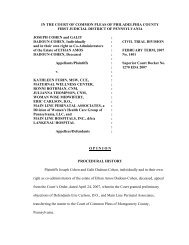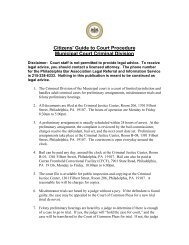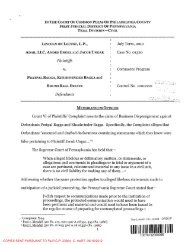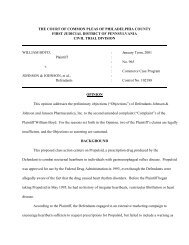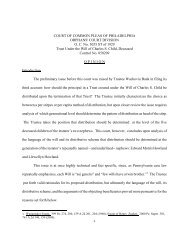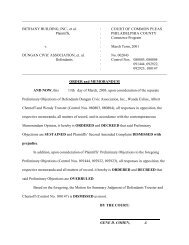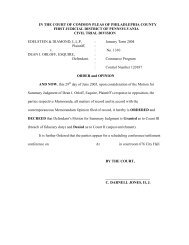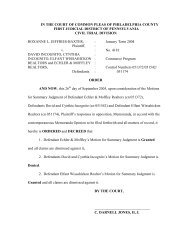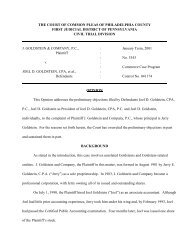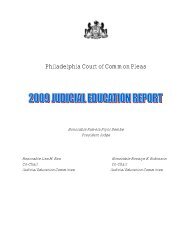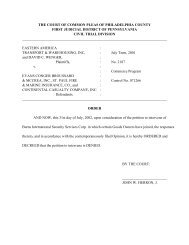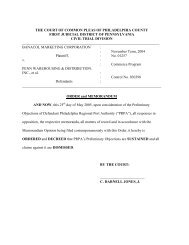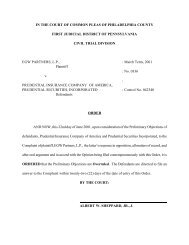OPINION - The Philadelphia Courts
OPINION - The Philadelphia Courts
OPINION - The Philadelphia Courts
You also want an ePaper? Increase the reach of your titles
YUMPU automatically turns print PDFs into web optimized ePapers that Google loves.
IN THE COURT OF COMMON PLEAS OF PHILADELPHIA COUNTY<br />
FIRST JUDICIAL DISTRICT OF PENNSYLVANIA<br />
CIVIL TRIAL DIVISION<br />
MSWPA, INC. and MICHAEL S. :<br />
WILLIAMS : JUNE TERM 2005<br />
Appellees, :<br />
v. : NO. 0973<br />
:<br />
:<br />
DAN M. ACHEK and ACHEK DESIGN & :<br />
CONSTRUCTION CO. INC. :<br />
Appellants. :<br />
<strong>OPINION</strong><br />
Dan Achek and Achek Design & Construction Co. Inc. (hereinafter “appellants”)<br />
appeal from the Court’s Order dated October 3, 2005, whereby MSWPA, Inc. and<br />
Michael S. Williams’ (hereinafter “appellees”) preliminary objections to appellants’<br />
counterclaims were sustained and appellants’ counterclaims were dismissed.<br />
Procedural History<br />
Appellees filed their Complaint in this matter on June 13, 2005. On July 28,<br />
2005, appellants filed their Answer to appellees’ Complaint with New Matter and<br />
Counterclaims. Appellees filed preliminary objections to appellants’ counterclaims on<br />
August 5, 2005. Subsequently, appellants filed their answer to appellees’ preliminary<br />
objections on August 26, 2005. On September 6, 2005, appellees filed their Motion to<br />
Determine Preliminary Objections pursuant to <strong>Philadelphia</strong> Civil Rule *1028(c). 1<br />
However, appellants did not file a response to the Motion to Determine Preliminary<br />
Objections within the response deadline. <strong>The</strong>refore, pursuant to local court procedure,<br />
1 Phila. Civ. Rule *1028(c) states, in pertinent part: “Within thirty (30) days after filing Preliminary<br />
Objections with the Prothonotary, provided an amended pleading has not been filed, the objecting party<br />
shall file a Motion to Determine the Preliminary Objections…”
appellees’ Motion to Determine Preliminary Objections was sent by Motions Court to the<br />
trial judge without a response to the Motion to Determine Preliminary Objections and<br />
with the notation “uncontested.” <strong>The</strong> Court then entered an order on October 3, 2005,<br />
which sustained appellees’ preliminary objections as “uncontested” and dismissed<br />
appellants’ counterclaims with prejudice.<br />
On November 2, 2005, appellants filed a Motion for Reconsideration seeking<br />
reconsideration of the Court’s Order dated October 3, 2005, and docketed in October 4,<br />
2005. <strong>The</strong> Motion for Reconsideration was assigned to the trial judge on November 4,<br />
2005. <strong>The</strong> Court had thirty (30) days from the date of entry of the Order to act upon the<br />
Motion for Reconsideration. 2 <strong>The</strong> thirty-day period expired on November 3, 2005.<br />
Since the Court did not receive the Motion for Reconsideration until November 4, 2005,<br />
it was without jurisdiction to act upon the Motion for Reconsideration. <strong>The</strong>refore, the<br />
Court dismissed appellants’ Motion for Reconsideration. Appellants timely filed their<br />
notice of appeal.<br />
Discussion<br />
Appellants argue that the Court erred in sustaining appellees’ preliminary<br />
objections because they “filed a timely response to [appellees’] Preliminary Objections.”<br />
See Appellants’ 1925(b) Statement of Matter Complained of, 1. However, appellants<br />
are confusing an “answer to preliminary objections” with a “response to a motion to<br />
2 See Schoff v. Richter, 386 Pa. Super. 289, 291, 562 A.2d 912, 913 (1989) (“<strong>The</strong> trial court is permitted to<br />
grant reconsideration only if such action is taken during the applicable appeal period. An order granting<br />
reconsideration will only be effective if it is made and entered on the docket before expiration of the<br />
applicable appeal period, 30 days from the entry of the order which is the subject of the reconsideration<br />
motion, and if it states that it is expressly granting reconsideration.”); Commonwealth v. Moir, 2000 Pa.<br />
Super 403, *P4, 766 A.2d 1253, 1254 (2000) (“Failure to expressly grant reconsideration within the time<br />
set by the rules for filing an appeal will cause the trial court to lose its power to act on the application for<br />
reconsideration.”); See also Pa. R.A.P. 1701 (“Effect of Appeal Generally”) and its comment.<br />
2
determine preliminary objections.” 3 Appellants are correct that they timely filed an<br />
answer to appellees’ preliminary objections. However, appellants never filed a response<br />
to appellees’ Motion to Determine Preliminary Objections. “It is only within the<br />
response to the Motion [to Determine Preliminary Objections] that a responding party has<br />
the opportunity to include a Memorandum of Law explaining to the Court why the<br />
preliminary objections should be overruled.” See Durkin v. Breen, 2005 Phila. Ct. Com.<br />
Pl. LEXIS 391, *2-3 (2005).<br />
Motions Court in <strong>Philadelphia</strong> County will only send a motion to the appropriate<br />
judge for consideration when there is a complete motion “package.” According to the<br />
<strong>Philadelphia</strong> Court of Common Pleas Civil Practice Manual, “When the motion is<br />
initially filed, the motion clerk enters the response date into a computer. When that date<br />
arrives, the motion file is forwarded to the appropriate judge for determination, whether<br />
the response has been filed or not. It is incumbent upon responding counsel to respond to<br />
the motion in a timely fashion…” See Civil Practice Manual, Twelfth Edition, § 7-2.7.<br />
Appellants simply failed to follow the local rules by not filing a timely Response to the<br />
Motion to Determine Preliminary Objections.<br />
<strong>The</strong> case of Schuylkill Navy v. Langbord, 1999 Pa. Super. 75, 728 A.2d 964<br />
(1999) is particularly applicable to the case at bar. Similar to the present case, the<br />
appellants in Schuylkill Navy filed an answer to appellees’ preliminary objections, but<br />
failed to file a response with supporting memorandum of law in a responsive motion<br />
3 Indeed, the <strong>Philadelphia</strong> Civil Rules distinguish between an answer to preliminary objections and a<br />
response to a motion to determine preliminary objections. See Phila. Civ. Rule *1028(c)(5) (“An answer<br />
to preliminary objections (as opposed to a Response to the Motion to Determine Preliminary Objections) is<br />
required only to preliminary objections raising an issue under Pa.R.C.P. 1028 (a)(1), (5) and (6) provided a<br />
notice to plead is attached to the preliminary objections. An answer need not be filed to preliminary<br />
objections raising an issue under Pa.R.C.P. 1028(a)(2), (3) and (4).”) (emphasis added).<br />
3
package. <strong>The</strong> trial court sustained appellees’ preliminary objections as “uncontested.”<br />
Appellants then filed an appeal of the trial court’s decision. On appeal, the Superior<br />
Court upheld the trial court’s decision and found that the trial court did not err when it<br />
failed to consider appellants’ answer to the preliminary objections. <strong>The</strong> Superior Court<br />
stated:<br />
Appellants ignored critical filing procedures essential to<br />
proper motion court practice in <strong>Philadelphia</strong> County. Thus,<br />
Appellants did not ensure that their responses to Appellees'<br />
preliminary objections would be before the trial court for<br />
its consideration as Appellants simply did not follow the<br />
rules. <strong>The</strong>refore, Appellants cannot now complain that the<br />
trial court erred when it failed to consider their responses to<br />
Appellees' preliminary objections. Accordingly, we agree<br />
with the trial court that Appellants' blunder is not excusable<br />
and does not constitute trial court error.<br />
Schuylkill Navy, 1999 Pa. Super. at *P10, 728 A.2d at 968.<br />
Were it not for appellants in the case at bar filing their Motion for<br />
Reconsideration (to consider its Response to the Motion to Determine Preliminary<br />
Objections) in such a manner that the trial judge was assigned the Motion after losing<br />
jurisdiction, the Motion would have been considered on its merits, and at least appellants<br />
would have be given an opportunity to amend their counterclaim in the event the<br />
preliminary objections to the counterclaim were sustained on the merits. This Court<br />
suggests that the matter be remanded for further proceedings related to the preliminary<br />
objections, despite the procedural chaos created by appellants.<br />
Dated: December 13, 2005<br />
4<br />
BY THE COURT:<br />
______________________________<br />
HOWLAND W. ABRAMSON, J.


